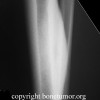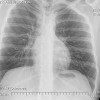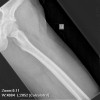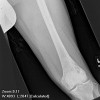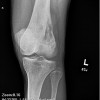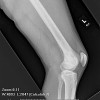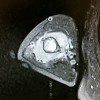Case Identification
Case ID Number
Tumor Type
Body region
Benign or Malignant
Clinical case information
Case presentation
Patient is a professional chef, and reports pain in the knee for more than 10 years. There is reduced motion accompanied by a palpable vibration in the knee when the patient flexes and extends the joint.
Radiological findings:
Examination of the left knee shows dramatic the of the right with a known swelling, there is reduced motion due to fluid. There is so much fluid in the knee that flexing and extending the knee is slow because the fluid needs to move to allow the motion. This is accompanied by a palpable vibration in the knee when the patient flexes and extends the joint. No loose bodies or crepitus is felt. Rather the palpable sensation in the knee with motion seems to be related to fluid shift.
The x-ray findings are consistent with moderate to severely advanced osteoarthritis, but show no other definitive features. There is generalized joint space narrowing, some mild irregularity of there are some small bone spurs and the opposite knee shows totally normal bone anatomy.
The MRI shows severe damage to the joint and an impressive effusion. There is generalized narrowing of the cartilage, subchondral bone edema, bone spurs, and a large effusion that had extended into the posterior aspect of the knee around the hamstring tendons. No loose bodies are seen in the joint
The x-ray findings are consistent with moderate to severely advanced osteoarthritis, but show no other definitive features. There is generalized joint space narrowing, some mild irregularity of there are some small bone spurs and the opposite knee shows totally normal bone anatomy.
The MRI shows severe damage to the joint and an impressive effusion. There is generalized narrowing of the cartilage, subchondral bone edema, bone spurs, and a large effusion that had extended into the posterior aspect of the knee around the hamstring tendons. No loose bodies are seen in the joint
Differential Diagnosis
PVNS
Special Features of this Case:
This case is typical of the underlying diagnosis. It has reached a relatively advanced stage. In this particular case, the patient has been able to maintain his function by taking large daily doses of narcotic pain medicines. This may actually allow exacerbation or potentiation of the reactive process.
Imagen
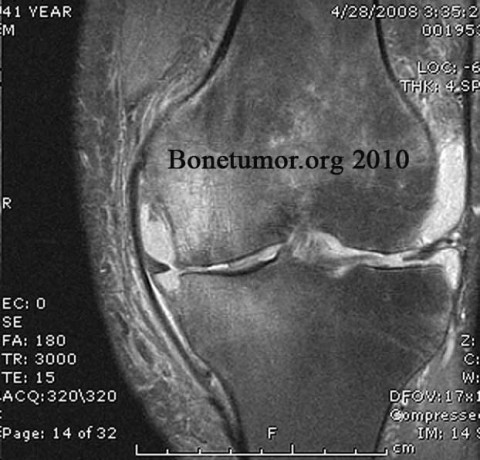
Case ID Number
Image Types
Image modality
Tumor Name
Benign or Malignant

